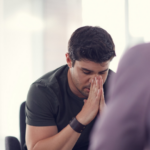Former Australian Federal Police (AFP) commander and strongman Grant Edwards spent 34 years fighting child exploitation, human trafficking and organised crime around the world. The job took a significant psychological toll on the dad-of-two. Recognising he had a post-traumatic stress injury and speaking up amongst a culture of secrecy and stigma wasn’t easy.
When you join the police you’ll experience some hard things, but it wasn’t spoken about during training or even the first 25 years of my career. You get on with the job, suck it up and move on. Never once did I think I would suffer a mental health injury. I thought I was reasonably knowledgeable about the body and the mind. It caught me very much by surprise.
With the benefit of therapy, and in hindsight, I can identify periods of my life when I started to go down a slippery slope. In policing, there’s been a culture that doesn’t accept weakness. Particularly back when I started and particularly in men. You’re there to help fix people and fix situations, you don’t expect anyone should have to fix you. I fell completely into that trap.
The were many parts of my work in the Australian Federal Police (AFP) that impacted me psychologically, especially dealing with child exploitation. As police, when children are being harmed, you really want to help, you really want to take perpetrators off the street. Back in the early 2000’s I led the team that was dealing with burgeoning online child exploitation material, which involved sitting in front of a computer going through quite graphic material. I was then involved in setting up Australia’s first human trafficking unit, dealing with the sexual exploitation of women, and sometimes young children who were deceptively recruited to work in brothels in horrendous conditions. As part of the AFP International Liaison Network I worked in Los Angeles, East Timor, Afghanistan and Washington DC. I experienced being pulled out of a car at gunpoint in East Timor. In Afghanistan, I was responsible for managing the Australian AFP team training police while dealing with car bombings, assassinations, murders and attacks on our compound.
“That continual exposure to trauma, the mind has nowhere to go. It just kept building and building and building.”
When I came home from Afghanistan, things really started to unravel. I’d only been home a few days. I was so grateful to be home. I was training at my local park when I heard rapid fire and panicked – I couldn’t reconcile what was happening. I knew I wasn’t in Afghanistan but I hit the deck, agitated and confused. It turned out that they had a paintball thing at the park during the school holidays. That triggered me and I thought, “Oh, that’s not good.” I mentioned to the work psychologist that this had happened, and they were kind of dismissive saying, “Well, that’s hypervigilance. That’s understandable. You were working in a war zone, it’ll go away.” But it didn’t.
Things started to get worse. I started undertaking maladaptive behaviours – I was drinking and taking sleeping pills because I couldn’t sleep. I was having nightmares and a lot of other classic symptoms. I was completely withdrawn from my family. I stopped doing the things that I liked. I stopped going places, I didn’t want to talk to people. I spent most of my time alone and isolated. But I dismissed it.
I saw my GP about having trouble sleeping and he said to me, “Grant, I think you have post-traumatic stress disorder.” And I didn’t want to hear that. I thought I was going to lose my job, and my security clearance, if I was diagnosed with that. I thought, “What were people going to think?” The doctor gave me a script for antidepressants. I went back the next day and handed it back and said please redact this from my record. That’s how strong the stigma that I thought was associated with PTSD was and what it meant to me.
I just kept trying to fumble on through life. I eventually made an attempt on my life because things had gotten so bad. I didn’t tell anyone I was so ashamed and embarrassed.
I was then selected for a role in Washington DC and I shadowed the colleague I was taking over from. I remember saying to myself, “I can’t do this.” I was exhausted physically, emotionally, psychologically. So I told him, I said, “I’ve got PTSD.” I thought I’d be pushed aside in the organisation or medically retired, but he said to give the boss a call. When I confided in the commissioner he asked three things. He said, are you going to get treatment? And I said yes. He said, will you take the medication if the doctor or psychiatrist says to? I said yes. And he said if you take this job will you do the same? And I said yes, why? Thinking I was done. He said, because I’d rather know that someone is struggling with an issue and we can put some mechanisms around them, rather than someone go overseas who doesn’t tell me, and I don’t know and then a catastrophic situation occurs. He said I don’t have a problem with you going and taking that job if you do those things that I asked.
That was a cathartic moment and I actually felt empowered after that. From that day on I’ve been on a good path. I educated myself.
“I was ignorant and somewhat arrogant. I assumed PTSI was just in people in the military because that’s what you hear most, but I didn’t realise how prevalent it is in society. It can happen to anybody. And there are so many people who aren’t recorded because they don’t want to be part of the statistic, because of the stigma. The more I read the more I realised I’m not alone. Talking about it and listening to others helps validate that.”
We embrace and celebrate the diversity of abilities, genders, sexualities, relationship identities, bodies, and cultures within our community.
Lorem ipsum dolor sit amet, consectetur adipiscing elit. Suspendisse varius enim in eros elementum tristique.
Lectus facilisis augue ut fusce in dis nunc
I don’t like to call it a disorder because a disorder suggests it’s genetic or inherent. Most people get it through an injury or an incident. You can also reconcile that you were once okay, it wasn’t something that you were born with or something you’ll always have, and you’ve got a benchmark to work back towards or get as close as you can get.
There’s no one-size-fits-all for treatment. You’ve got to sift through the various options to work out what’s best for you. It took me about five psychologists to find the right one and that was an exhausting process, having to relive your trauma every time. But when you find the right one, it’s great because the more you start to trust them, the more you can open up and talk about things.
I learned more about the connection between mental health and physical health. I always struggled with mindfulness and meditation, but I realised that being outdoors and working out is a form of it that I love. Recognising when you’re starting to get triggered or elevated is hard because you often don’t realise until it’s too late. That’s a lot of self-learning. Breathing is an important way I calm my system.
I now share my experiences to encourage those who might be like me — sitting there not wanting to speak up, seek help, or they’re feeling alone. I want to encourage people, especially men, to come forward and not be afraid to disclose a psychological injury. It’s tough, but it’s better than your other options.
Audrey Fagan, the chief police officer of ACT, was a good friend of mine. She was struggling and we’d been meaning to catch up for a long time. I bumped into her in the lift at work. She was going down, I was waiting for the lift and the doors open, and we both pointed at one another, and she said, “Let’s have coffee next Monday.” And I went, “Yeah, great.” I remember thinking, wow, that’s the happiest I’ve seen her for a long time. That Friday night I got the phone call to say she had taken her own life. Her death has a profound impact on me.
Between 2017 and 2019, five AFP officers took their own lives at work. In the midst of this, I decided to send an email to the entire AFP staff about my experience with trauma and PTSI and say that if you’re struggling or you know someone who’s struggling, come forward. The response was overwhelmingly supportive, and it got people talking. A lot of people said, “Wow we never would have picked it.” And that’s part of the problem. You can cover it up.
Not everybody wants to talk. I didn’t initially, and I get that, it’s a highly individual process. But just know that there are people out there that care. There are ways to help manage this. If you are desensitised, you’re going to say, “I’m fine. There’s nothing wrong with me.” Well go and see a psychologist anyway. I say to people, “Have you got a car? Do you get a service every year? Do you go to the doctor and get a medical every year? Well, why don’t you go see a psychologist?” You might think nothing is wrong, but there’s nothing wrong with your car and you still get it serviced.
The main point is to find someone that you can talk to. It doesn’t even have to be a psychologist, it could be a friend, it could be a work colleague, it could be someone in the community, it could be someone that’s just happy to listen. Sometimes just by talking yourself through things, you come to the realisation, okay, maybe I need to take it a step further with treatment.
It’s important to understand that it’s not the end of the world, but the sooner you seek help, the better off you’ll be, the better off you’ll be able to handle it.
You can can get Grant’s book, The Strong Man: A powerful story of life under fire and one man’s journey back from the brink, through Simon & Schuster or Amazon.com.au. For more information about post-traumatic stress injury you can find resources at Phoenix Australia.
“Mattis nibh scelerisque mollis amet facilisi metus vitae magna tellus. Phasellus a euismod id purus adipiscing urna. Ante vivamus dictum tincidunt amet ut semper. Tellus morbi ac amet.”
– Name here
















